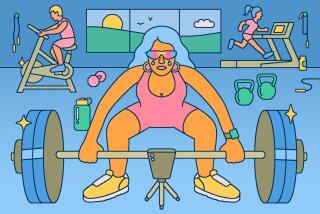For Kenyans, Fitness Becomes Creative Exercise
NAIROBI, Kenya â Leonard Odongo begins each morning bench-pressing 265 pounds of concrete blocks attached to the ends of an iron rod. His hand weights, chest expander and other workout equipment are crafted from metal sticks and stones. Four friends, equally trim and toned, join the muscular 22-year-old in his backyard gym.
It doesnât matter what youâre using to pump iron, Odongo contends, as long as youâre doing it. The key is âto get in shape. People have developed the desire to be fit. They are trying to adopt the Western lifestyle.â
For the record:
12:00 a.m. Oct. 31, 1998 For the Record
Los Angeles Times Saturday October 31, 1998 Home Edition Part A Page 3 Foreign Desk 1 inches; 27 words Type of Material: Correction
Kenya photo credit--The photograph that accompanied a story in Fridayâs editions about Kenyaâs fitness craze was incorrectly attributed. It was taken by freelancer Elias Okach for The Times.
Odongo and his friends are among a growing number of Kenyans caught up in a new physical fitness craze.
Makeshift backyard gyms--which typically require donation of a concrete block or iron rod for membership--pepper properties in lower-income neighborhoods across Nairobi, the capital. In more-affluent areas, dozens of health and fitness centers are springing up in office buildings and shopping plazas. They are challenging more established facilities that are located in Nairobi hotels and primarily cater to guests and the cityâs business elite.
There are no exact figures available on the number of clubs. However, some sports gurus and local observers believe that health clubs are among Kenyaâs fastest-growing industries. The clubs are sprouting in response to the general populationâs desire to change its physical image.
âItâs part of a global trend,â said Frank Njenga, a Nairobi-based psychiatrist and a regular commentator on social trends in Kenya. âPreviously, a new pub would come up every month. Now, what we have opening are health and fitness clubs. I think the message is finally getting through to Kenyans that prevention [of weight gain and illness] is better than cure.â
At Sequinpark Gymnasium, one of Nairobiâs newest clubs, clients may pay rates ranging from $5 a day to $500 a year for a cocktail of step aerobics, conventional high-impact exercise classes, taekwondo and use of imported machines. Additional pounds can be sweated off in a compact steam room.
Phyllis Mburu, Sequinparkâs owner, said most of her clients were simply following a trend. âItâs more of a fashion,â she said. âPeople are told: âIf you exercise, you will lose weight.â â
At the less-modern Goldeâs Gym, just 50 yards from Sequinpark, charges range from $1 a day to $17 a month. Tony Okumu, an instructor, agreed that, in todayâs Nairobi, âif youâre not training, then people think somethingâs wrong with you. Itâs the in thing.â
High unemployment, economic troubles and the general frustrations of urban life have driven many to seek healthier living.
âNairobi life has become extremely stressful,â said Isaac Tsurwa, manager of the health and fitness center at the prestigious Norfolk Hotel, which offers aerobics, swimming, personal training on high-tech machines and a sauna. âPeople who are well-to-do are leading a sedentary lifestyle--to work, to the car and then to the bar. Life has put a lot of pressure on Nairobians. It has given people no choice but to turn up to a club if they want to survive.â
However, Tsurwa cautioned that some fitness centers lack adequate exercise space, modern equipment and trained instructors. No special license is needed to establish and run a health club, and there is no school for instructors.
Training in their own backyard, like Odongo and his friends do, is one of the most frequent ways that instructors start in the business.
âThe biggest drawback to this is the health and safety aspects,â said Sam Dennis, a British-certified aerobics instructor. âThere are controversial stretches and workouts. It also helps to understand the music and what youâre doing. Like anything else, youâre a better teacher if youâre qualified.â
For many fitness fans, working out has simply become habit-forming.
âYou socialize and meet people,â said Wairimu Waiyaki, a 32-year-old secretary for an international accounting firm who has been a regular at the Norfolk gym for more than a year.
âI really couldnât care if I lost weight,â Waiyaki said. âI just want to be fit. It has alleviated my stress, and itâs become a lifestyle.â
More to Read
Sign up for Essential California
The most important California stories and recommendations in your inbox every morning.
You may occasionally receive promotional content from the Los Angeles Times.











